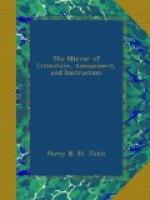“The first of Term, the fatal day, Doth various images convey; First, from the courts with clam’rous bawl, The criers their attornies call; One of the gown discreet and wise, By proper means his witness tries; From Wreathock’s gang, not right or laws, H’ assures his trembling client’s cause. This gnaws his haudkerchies, whilst that Gives the kind ogling nymph his hat; Here one in love with choristers, Minds singing more than law affairs. A Serjeant limping on behind, Shews justice lame as well as blind. To gain new clients some dispute, Others protract an ancient suit, Jargon and noise alone prevail, Whilst sense and reason’s sure to fail: At Babel thus law terms begun, And now at West——er go on.”
At page 24, of the Poem, there is a happy allusion to the permanence or lasting of a limitation:
“But if the limitation’s made
So long as cheating’s us’d
in trade,
Or vice prevails: ’tis then
a fee,
As good as ever need to be:
For tho’ ’tis base instead
of pure,
Alas it ever will endure.”
Upon this passage is the following confirmative note: “Cheating will always prevail, in defiance of all human laws, for it cannot be avoided, but so long as contracts be suffered, many offences shall follow thereby.”—(Doctor and Student, c. 3.) In buying and selling, the law of nations connives at some cunning and overreaching in respect of the price. By the civil law, a just price is said to be that, whereby neither the buyer nor seller is injured above one moiety of the true and common value; and in this case the person injured shall not be relieved by rescinding the sale, for he must impute it to his own imprudence and indiscretion.
The origin of Fee-tail estates:
“The expression, fee-tail, was borrowed from the feudists, among whom it signified any mutilated or truncated inheritance from which the heirs general were cut off, being derived from the barbarous word taliare to cut.—(2 Blac. Comm. 112.)
Fines and Recoveries (as fund and refund,) are like the poles, arctic and attractive. Of the latter is the following quid-pro-quo anecdote:
“A physician of an acrimonious disposition, and having a thorough hatred of lawyers, was in company with a barrister, and in the course of conversation, reproached the profession of the latter with the use of phrases utterly unintelligible. ‘For example,’ said he, ’I never could understand what you lawyers mean by docking an entail.’ ‘That is very likely,’ answered the lawyer, ’but I will explain it to you; it is doing what you doctors never consent to—suffering a recovery.’
Among the notes to Rights and Titles is the following:




